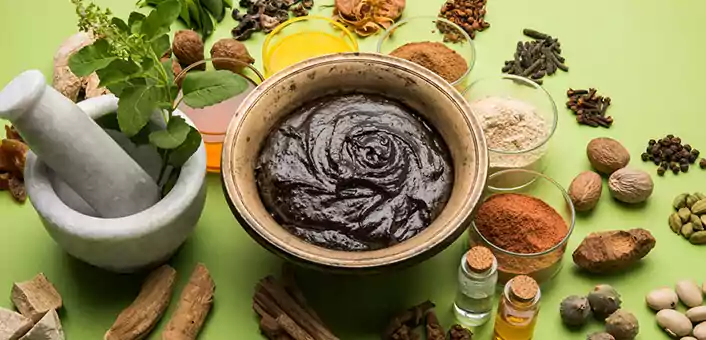PCOS test is based on the Rotterdam criteria for diagnosing PCOS.

Living Well
Almost every home in India knows about Chyawanprash. It’s an Ayurvedic preparation, traditionally of a paste consistency, had every day by all members of the family, except infants.
Chyawanprash is a herb based formulation and health supplement that can benefit both men and women alike. It tastes sweet, sour and a tad spicy, and looks has a pasty consistency with a brownish black color.
Earliest documented formulas available today date back at least 2000 years. It is considered a rasayana, a highly treasured preparation capable of preserving youth. Legend has it that it gets name from Chyavan Rishi, a sage who is said to have found his true love at the age of 90-plus. To start a family at that age, he needed to reverse his aging. He apparently created the formulation and ate it himself, to regain his youth. The Sanskrit verb for eating is “Prash”, so the paste that Chyavan ate to become youthful was named “Chyavan-prash”.
There are several small scale studies that show the efficacy of Chyavanprash in supporting conditions as diverse as diabetes, age-related vision loss, seasonal allergies, overall health and cognitive function.
The primary component in chyawanprash is amla or the Indian gooseberry. It has among the highest naturally occurring concentrations of Vitamin C, a potent anti-oxidant. But when amla is cooked with certain other spices and herbs, the potency of the mixture increases manifold. This has been proven in many in vitro studies.
Here are other ingredients apart from Amla that typically constitute Chyanwanprash:
The exact ingredients in every chyawanprash recipe can vary from one brand to another. The hue, taste, and thickness can also vary.
In terms of efficacy in the human body, in a research study conducted at India’s most prestigious government hospital AIIMS, it was found that the group who consumed 15 grams of chyavanprash per day did significantly better on post prandial glucose and blood cholesterol parameters than the group that consumed 500 mg of Vitamin C per day. Vitamin C in the right amount can help Asthma patients and also help fight inflammation in body.
In another recent study, college students who were given 15 grams of Chyawanprash twice a day for 150 days performed significantly better on cognitive tasks than they did before the intervention.
Maharishi Amrit Kalash, which is probably the western world’s most-studied Chyavanprash, has demonstrated significant improvements in allergic rhinitis, age-related vision loss and overall health.
The one argument often used against chyavanprash is that substantial amounts of honey or sugar are used in preparing it. Does this mean diabetics should certainly avoid it and others too should have it in very measured quantities?
We can go straight back to the AIIMS study to answer this one. For reasons that are not clear yet, the cooking of amla with the other herbs and spices seems to have a net blood sugar reduction effect in people who consume it! The mechanisms are not clearly understood, but post-prandial blood sugars were lower after consuming the chyavanprash, in the study. Ayurvedic doctors, like Dr.John Duillard ratify this from personal experience too, since they take the chyawanprash daily and measure their blood sugar at home every day.
So why stay away from this fantastic gift to human health from Ayurveda. Include this tasty paste in your daily regimen and reap the benefits from today. Wish you vibrant health and well being!
Indian J Physiol Pharmacol 2001 Jan;45(1):71-9 https://www.ncbi.nlm.nih.gov/pubmed/11211574
Chyavanprash effect on Cognitive, Autonomic and Respiratory Parameters of College Students: https://www.ijrap.net/admin/php/uploads/1229_pdf.pdf
Maharishi Amrit Kalash Studies https://www.mum.edu/pdf_msvs/v02/glaser.pdf